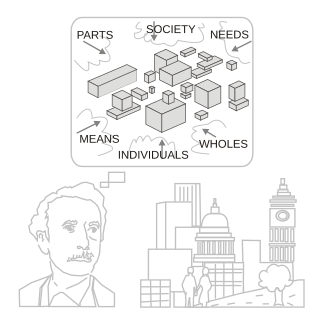Systems theory is the transdisciplinary study of systems, i.e. cohesive groups of interrelated, interdependent components that can be natural or artificial. Every system has causal boundaries, is influenced by its context, defined by its structure, function and role, and expressed through its relations with other systems. A system is "more than the sum of its parts" by expressing synergy or emergent behavior.

The following outline is provided as an overview of and topical guide to academic disciplines:

Theoretical computer science (TCS) is a subset of general computer science and mathematics that focuses on mathematical aspects of computer science such as the theory of computation, formal language theory, the lambda calculus and type theory.

Systems Science, also referred to as systems research, or, simply, systems, is a transdisciplinary mathematical field that is concerned with understanding simple and complex systems in nature and society, for which leads to the advancements of formal, natural, social, and applied attributions throughout engineering, technology and science, itself. Most importantly, Systems Science is foundational to the Embedded Software Development that is founded in the embedded requirements of Systems Engineering.

Computational sociology is a branch of sociology that uses computationally intensive methods to analyze and model social phenomena. Using computer simulations, artificial intelligence, complex statistical methods, and analytic approaches like social network analysis, computational sociology develops and tests theories of complex social processes through bottom-up modeling of social interactions.
John Nelson Warfield was an American systems scientist, who was professor and director of the Institute for Advanced Study in the Integrative Sciences (IASIS) at George Mason University, and president of the Systems, Man, and Cybernetics Society.
The following outline is provided as an overview of and topical guide to automation:
Dr. Lawrence Jerome Fogel was a pioneer in evolutionary computation and human factors analysis. He is known as the inventor of active noise cancellation and the father of evolutionary programming. His scientific career spanned nearly six decades and included electrical engineering, aerospace engineering, communication theory, human factors research, information processing, cybernetics, biotechnology, artificial intelligence, and computer science.

Management cybernetics is concerned with the application of cybernetics to management and organizations. "Management cybernetics" was first introduced by Stafford Beer in the late 1950s and introduces the various mechanisms of self-regulation applied by and to organizational settings, as seen through a cybernetics perspective. Beer developed the theory through a combination of practical applications and a series of influential books. The practical applications involved steel production, publishing and operations research in a large variety of different industries. Some consider that the full flowering of management cybernetics is represented in Beer's books. However, learning continues.
The International Society for the Systems Sciences (ISSS) is a worldwide organization for systems sciences. The overall purpose of the ISSS is:
to promote the development of conceptual frameworks based on general system theory, as well as their implementation in practice. It further seeks to encourage research and facilitate communication between and among scientists and professionals from various disciplines and professions at local, regional, national, and international levels.
Peter Andrew Corning is an American biologist, consultant, and complex systems scientist, Director of the Institute for the Study of Complex Systems, in Seattle, Washington. He is known especially for his work on the causal role of synergy in evolution.

Cybernetics is a field of systems theory that studies circular causal systems whose outputs are also inputs, such as feedback systems. It is concerned with the general principles of circular causal processes, including in ecological, technological, biological, cognitive and social systems and also in the context of practical activities such as designing, learning, and managing.
The IEEE Systems, Man, and Cybernetics Society is a professional society of the IEEE. It aims "to serve the interests of its members and the community at large by promoting the theory, practice, and interdisciplinary aspects of systems science and engineering, human-machine systems, and cybernetics".
Mengchu Zhou is a Chinese-American Distinguished Professor of electrical and computer engineering in the Helen and John C. Hartmann Dept. of Electrical and Computer Engineering at New Jersey Institute of Technology (NJIT) and at Macau University of Science and Technology. He is the Chairman of IKAS Industries of Shenzhen in China and a Board Member of OneSmart Education Group headquartered in China.